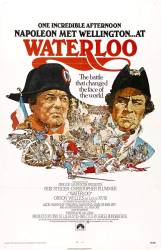Revealing mistake: The cannons shown are firing blank charges, which produce no recoil. Recoil has been simulated by towing the guns backwards when they fire. The problem is, there is always a distinct delay between the discharge and the "recoil." The cannon also seem to largely fire explosive shells. At no point do we actually see a cannon ball rolling or bouncing along the ground or into any group of soldiers.
Factual error: In the movie you see Scottish Pipe Band playing. Pipe Bands where not established in Scottish Regiments before the Crimean War (1854-1856), there were only solo pipers. (00:35:00)
Factual error: In the opening scene, when the Marshals demand Napoleon's abdication, Marshal Soult should not be present. In actual fact he was fighting Wellington in the south of France (around Toulouse) at the time and did not hear of the abdication until around ten days later.
Factual error: In some of the scenes featuring the French storming Hougomont, close ups show some of the actors going over the wall as French infantry are actually carrying bolt-action Mosin Nagant rifles, a Russian weapon not introduced until the 1890's, as opposed to flintlock muskets.
Continuity mistake: During the entire battle the ground is sticky mud. When the French cavalry charge however the ground is dry, so dry there is dust coming from the horses' hooves as they gallop.
Factual error: Throughout the film the Allied troops (with the exception of the Artillery Corps) wear scarlet and the French wear blue. However, combatants in the battle wore much more diverse uniforms. Wellington, for example, had Dutch, Belgians and Germans (the King's German Legion) under his command who had different coloured uniforms - not to mention one of his most famous regiments, the 95th Rifles, who wore their traditional green. None of these are shown in the film at all.
Factual error: When Ney comes to make his report to Napoleon after Quatre-bras(Where Ney engaged the Allied army), he throws a captured British flag down before Napoleon. This flag is a green Regimental flag, with a sphinx insignia - But the only British flag captured at Quatre-bras was the Kings Colors of the 69th, which would be a great Union Flag with '69' in gold leaves.
Suggested correction: Might be worth while looking up a great painting called "The Last Trophies" - this shows 5 Infantry Colours.
Factual error: Towards the end of the film, the British are shown to be re-capturing La Haye Sainte. The British never re-captured it until the battle was over.
Continuity mistake: When Ponsonby is killed by lancers, his horse struggles in the mud. One of the shots shows a dark brown horse's legs getting stuck in the mud. All other shots show a grey horse.
Factual error: Toward the end of the movie, when the Prussians finally arrive, they enter the scene from the left of the frame; this would have been the British/Allied right flank and the French left flank since the scene is shot from the French point-of-view. In actual fact, the Prussians entered the battle on the British/Allied left flank and the French right flank, so they should have entered the scene from the right side of the frame.
Factual error: Before the battle it rains. The dye used in the British red uniforms of that period was so poor, that any rain would make it run. As a result, most of the British army went into the battlefield with "pink" trousers, rather than the unstained trousers shown in the film.
Factual error: The British army is wearing "normal" (left/right) boots. Wellington's soldiers were issued with two identical boots that could be worn on either foot, and were actually instructed to swap them from foot to foot regularly to even out wear and make them last longer.
Revealing mistake: During the battle, both the Allied and French commands spot unknown troops marching towards the battlefield. They are marching through what looks like a wheatfield, following paths which have already been made. However, these new troops are marching on a route so far unused by either the French or Allied armies, so therefore the field should have been untouched - these paths were made on the first take.
Audio problem: When Ponsonby is being pursued by the Polish Lancers across the muddy field, he gives his watch and snuff box to the young bugler and tells him to ride on and save himself. However, his lips do not correspond to the words.
Factual error: At no time during any of the battle scenes do we see any of the soldiers actually loading their muskets, despite the lengthy and time-consuming process which it took to carry out the priming and firing of these weapons.
Factual error: In De Lancey's death scene, you can see the actor's modern dental work.





